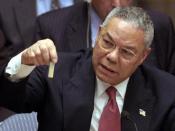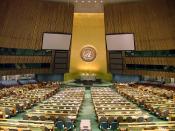In articulating what some have described as the 'most far-reaching shift in American foreign policy for more than fifty years,' President George Bush summed up the US perception of the current strategic situation in the post 9-11 world,
"We cannot put our faith in the word of tyrants, who solemnly sign non-proliferation treaties and then systematically break them. If we wait for threats to fully materialize, we will have waited too long. [In defending the US today] we face a threat with no precedent [due to] the perilous crossroads of radicalism and technology coupled with the ability of weak nations and small groups to attain the catastrophic power of striking with chemical, biological and nuclear weapons. New threats require new thinkingâ¦"
A world in which rouge states ('weak nations') and international terrorists ('small groups') threaten the US and other liberal democracies, potentially with weapons of mass destruction, unperturbed by traditional methods of deterrence, is one in which the Bush Administration sees security as attainable by going on the offensive - first in Afghanistan, then in Iraq.
As to whether this pre-emptive doctrine can provide the basis for a sound policy for the future, this essay will seek to examine three closely related areas; firstly pre-emption's legality - the conflict in Iraq was built up on the basis of the 'Bush Doctrine' causing antagonism within the Security Council, which may yet prove to have been terminally damaging - can a policy be sound if its legality is in question? Secondly, how politically sustainable is such a policy? And finally, how practical is pre-emption - is it likely to be effective?
In terms of customary international law (the body of law created by practice and precedent over time and distinct from that of treaty law), self-defence is certainly recognized as a legitimate...


